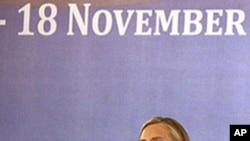The State Department said Friday Secretary of State Hillary Clinton’s groundbreaking visit to Burma early next month will be a test of the Burmese government’s stated commitments to democratic reforms. Among other things, Clinton will press authorities to release all the country’s political prisoners.
Officials here are stressing President Obama’s comment at the East Asian summit in Bali that reform moves by Burma represent only “flickers of progress” and that Clinton’s mission will be to test the government’s willingness to go farther.
Clinton’s visit, announced in Bali, will be the first by a secretary of state to the reclusive Southeast Asian nation in more than 50 years.
It caps a process of increasing dialogue between the United States and Burma that began when a nominally-civilian government took power in March after decades of military rule.
At a news briefing, State Department deputy spokesman Mark Toner said there will be no surprises in Clinton’s agenda in Burma.
He said she will stress the need for authorities to follow through with a reform agenda that has included the release of, and dialogue with, opposition leader and former detainee Aung San Suu Kyi.
“What we want to see is the release of all political prisoners, and we want to see amended electoral laws, we want to see an opening of the political system there that allows for free and fair elections," said Toner. "That’s what we’re looking for. We’re looking for an opening up of the political space.”
Burma released 200 political prisoners earlier this year.
Human rights groups and Burmese democracy activists have faulted the Burmese authorities for releasing only a fraction of what was estimated earlier this year to be some 2,000 people being held for political reasons.
But the activists have generally welcomed U.S. outreach including the Clinton visit.
Jennifer Quigley, advocacy director of the Washington-based U.S. Campaign for Burma, said the group welcomes the Obama administration’s increased focus on Burma, including the naming last April of a special envoy for Burma, Derek Mitchell.
Quigley commended the administration for withholding major concessions to Burma, including a lifting of sanctions, until there is tangible political change.
“What’s been good thus far is that Ambassador Mitchell, and we hope that continues with Secretary Clinton, is that they maintain that level of ‘we’re not going to give you something until we really see some concrete irreversible changes.’ And the release of 200 political prisoners just doesn’t do it," said Quigley.
Quigley said her group hopes for the release of a large number of additional political prisoners, if not all of them, in the run-up to the Clinton visit as a sign of good faith.
The United States imposed a near total ban on U.S. trade with Burma during the Bush administration because of political repression by the previous military government.
It maintains diplomatic relations with Burma but at a sub-ambassadorial level and has not accepted the former government’s change of the country’s official name to Myanmar.
State Department spokesman Toner said the administration has not yet approached Congress about lifting sanctions and believes the name issue is a matter to be decided by the Burmese people.
US: Clinton to Press for Follow-Through on Reforms in Burma















